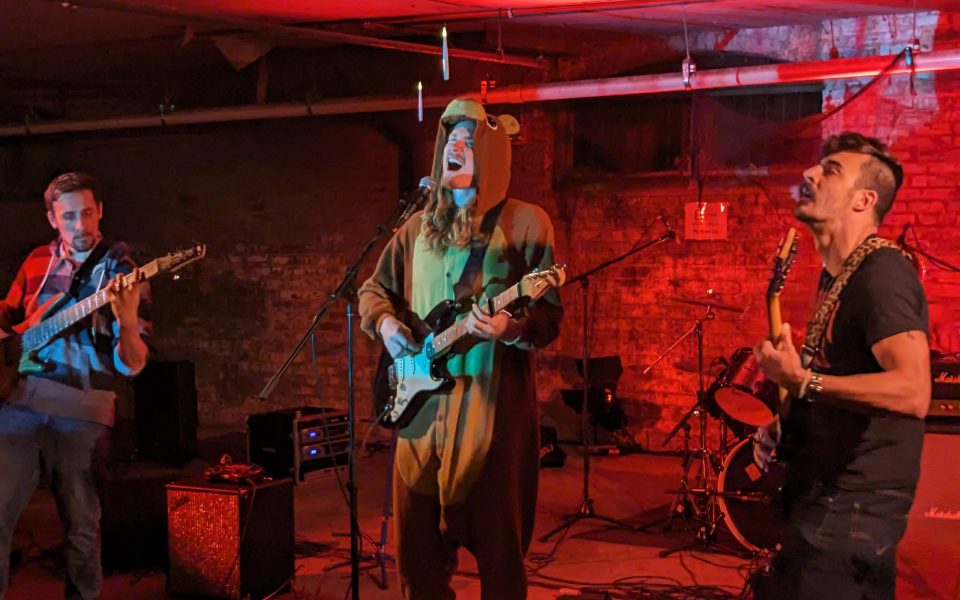Almost as soon as rapper/producer PhazeGod took the stage to begin his set, he took it to the crowd.
He and his crew sauntered into the center of the audience to bring their act directly to the people. He rapped one-on-one; he chose dance partners from the gallery. In exaggerated movements, he sold every bar, every drop of the beat.
Like a conductor he anticipated the next phrase, worked it into his movements.
Here at the Lab, the distinction between audience and performer is not always so clear.
The Lab is a monthly event put on by the DOSE Collective in Winston Salem for the past year. DOSE came about in 2022 when Founder Taja Seafus set out to create a “safe space for creative, BIPOC, queer people to flourish in their craft and meet and connect with others just like themselves.”
They’ve got a space in the Arts District on Trade Street, where they host all manner of artistic events including acting classes, open jam sessions, poetry and what Seafus calls “creative work hours.”
“The space is free for anyone to use,” said Seafus, an artist herself. “You can come in here and work on music, painting, drawing; you can read a paper, whatever you may need. But it’s just like an open studio.”
There are also plans to host live music and experimental theater in the intimate space soon.
“We have, like, a half of a script for an immersive theatrical experience called Quinn,” explains Seafus, “which is a deep dive into the mental psyche of a queer POC, trying to navigate their adulthood and what they want to be”
The Lab grew out of this culture, a showcase of “underground and emerging” artists who lift each other up while honing their individual skills.
Performers and vendors get the opportunity to showcase their work just by filling out an online form on the DOSE website or through social media.
This month the performers included PhazeGod, metal group When We’re Sober, vocal improv group Siren Spell and a dance routine by Maura Close, among others, seven in all, with each act performing original work. The October installment took place in the lower parking deck under the Milton Rhodes Center for the Arts.
“It’s an underground event,” Seafus said. “It’s experimental. I feel like it should be in a different space.”
The space was dark, lit by small electric candles and a multi-colored light over the stage area. Plastic skeletons and ghosts hung from the ceiling. The white support pillars around the room were covered in doodles of rainbows, flowers, drawings of faces, pop-culture references and positive affirmations.
“You’re Ken-ough!”
“Go Piss Girl!”
Small slits of windows dotted the perimeter, giving a thin view of cars passing by on Second Street. Independent vendors set up along the edges of the room selling crochet goods, food, art, jewelry, clothing, stickers, prints and more.
Later, at the costume contest, both members of Lucid Amethyst wore black suits; Aaron Armwood had painted his face like a ghoul, Ashley Virginia from Siren’s Spell dressed as a cowgirl, and the members of jam band Dr. Shug came as food: a hot dog, candy corn, a bottle of sriracha.
Then every costumed person walked a runway strut down the center of the room. The winner, someone dressed as Hades from Disney’s Hercules, was determined by audience reception.
Then alt rock/metal band When We’re Sober finished out the night as members of other groups crowded the front of the stage. Grey Hyatt, wearing a bear onesie, filled the room with his deep, chanting vocal style. On guitar, Tony Luz was just showing off, playing intricate, fast ornaments between phrases, stepping into the beat like a frenzied metronome as a mosh pit began to form.
Join the First Amendment Society, a membership that goes directly to funding TCB‘s newsroom.
We believe that reporting can save the world.
The TCB First Amendment Society recognizes the vital role of a free, unfettered press with a bundling of local experiences designed to build community, and unique engagements with our newsroom that will help you understand, and shape, local journalism’s critical role in uplifting the people in our cities.
All revenue goes directly into the newsroom as reporters’ salaries and freelance commissions.


Leave a Reply